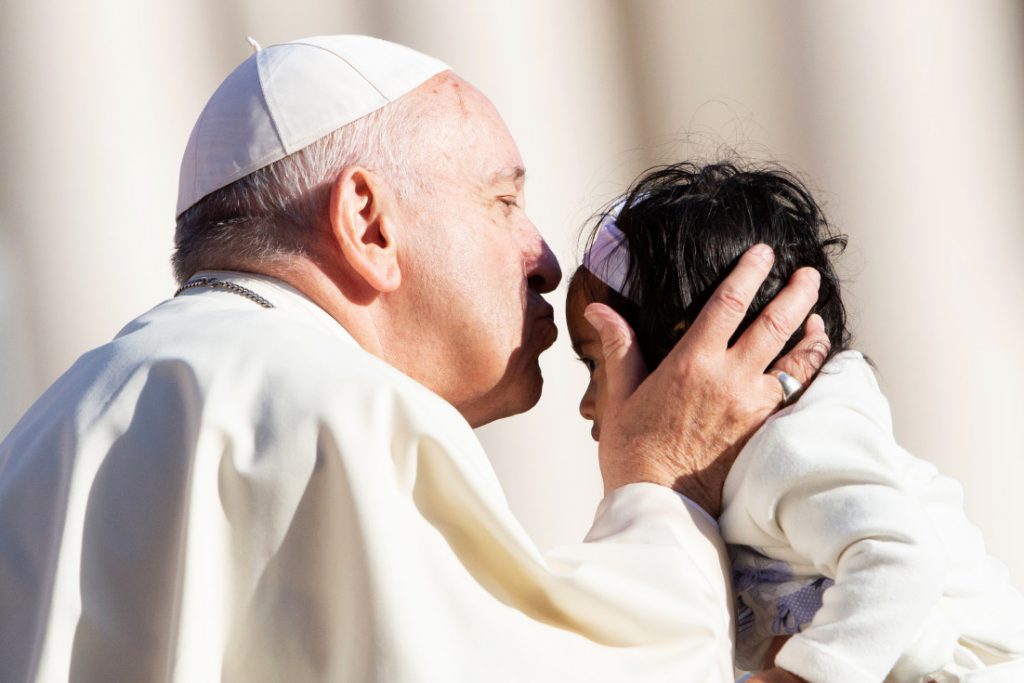
By Eric Martin
The Lord’s Prayer is the prayer of the Church, reaffirming every Christian’s identity as a beloved child of God and reminding Catholics of the responsibility they have towards their brothers and sisters in Christ – Pope Francis explained in the continuation of his catechesis on the Our Father.
“They show us what we have to do: love God, our Father, and others, our brothers and sisters. The ‘Our Father’ is the prayer of us, of the Church,” he said.
Indeed, so important is Christ’s example that the Our Father and its seven petitions have been enshrined in the Catechism of the Catholic Church:
“The first series of petitions carries us toward him, for his own sake: thy name, thy kingdom, thy will! It is characteristic of love to think first of the one whom we love. In none of the three petitions do we mention ourselves. These three supplications were already answered in the saving sacrifice of Christ, but they are henceforth directed in hope toward their final fulfilment, for God is not yet all in all.
“The second series of petitions unfolds with the same movement as certain Eucharistic epicleses: as an offering up of our expectations, that draws down upon itself the eyes of the Father of mercies. They go up from us and concern us from this very moment, in our present world: ‘give us, forgive us, lead us not, deliver us…’
“The fourth and fifth petitions concern our life as such – to be fed and to be healed of sin; the last two concern our battle for the victory of life – that battle of prayer.”
Focusing on the first three petitions, the Holy Father stressed that the wisdom of God runs contrary to the wisdom of the world and that real freedom is to submit to His will, rather than following the evil desires of our own hearts – that way lies slavery to sin.
“Therefore, praying, ‘thy will be done’, is not a ‘slavish’ act; obeying the Lord is not like obeying a slave master, or bending the will to an unchangeable destiny,” the Pontiff said.
“On the contrary, it is a prayer full of ardent trust in God who wants good for us, life, salvation.
“In fact, the ‘Our Father’ is the prayer of children, not slaves; but of children who know the heart of their father and are certain of his design of love.”
After all, God is love and his desire for us is always for good, not evil, and therefore his will for us, his perfect plan for us is also good, filled with the promise of discovering our true selves in and through his love and sacrifice for us.
“God with his love knocks on the door of our hearts. Why? To attract us; to attract us to Him and carry us forward on the path to salvation. God is close to each of us with his love, to take us by hand to salvation. How much love is behind this,” Pope Francis explained.
The world, he said, is fallen and full of evils such as war, the abuse of power and child exploitation. He urged Catholics to: “Pray with the awareness of the Lord’s will of good for his people and world, and to beg of him: your will be done!”.
Similarly, by praying out God’s will, which clearly desires the best for us and for others, our prayerful communication with God will inevitably be drawn to the needs of our brothers and sisters in Christ, the needs of our leaders and our nations.
“There is no room for individualism in dialogue with God,” Pope Francis added.
“There is no ‘I’ in the words of the ‘Our Father’ prayer. One’s prayer should not contain an ostentation of one’s problems as if we were the only ones in the world to suffer.
“In prayer, a Christian brings all the difficulties of the people who live next to him: when the evening descends, he tells God about the pains he has encountered on that day, putting before Him many faces, friends and even enemies,” he elaborated.
“Jesus teaches us to pray, having first of all ‘You’ on our lips because Christian prayer is dialogue: ‘hallowed be your name, your kingdom come, your will be done’,” he said.
It is about “you” and then “we”, a community of brothers and sisters.
“If one does not realise that there are many people around him who are suffering, if he does not pity for the tears of the poor, if he is addicted to everything, then it means that his heart is of stone,” Pope Francis added.
“In this case it is good to beg the Lord to touch us with his Spirit and to soften our heart,” he continued, so that as Christians our hearts are open to His words and receptive to His will.
Recalling Christ’s instructions to pray in “the silence of your room” where one can “withdraw from the world, and turn to God calling him ‘Father!’, the Pope warned Catholics to guard their hearts against pride and ensure that their prayers do not become a public act of hypocrisy.
“Prayer is, at its root, is a silent dialogue, like the crossing of glances between two people who love each other: man and God,” he explained. It is not seemly to engage others in this most private of conversations between an individual and their creator.